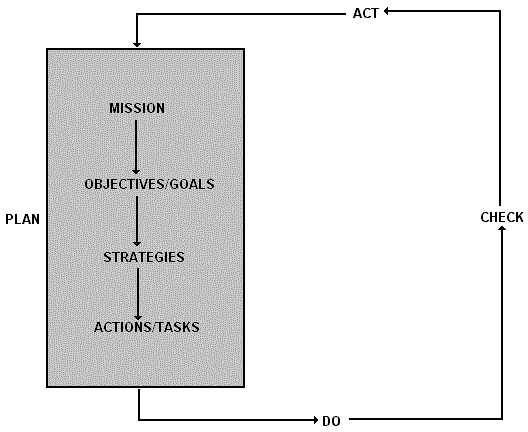Hoshin
Planning:
Hoshin is a Japanese word that
can be translated into English as "target", or "policy". Nevertheless,
this word is often used synonymously with "breakthrough issue(s)" for an
individual or organization.
Hoshin planning (policy
deployment) involves identification of driving or breakthrough issues for the
organization. It creates action plans for every member of the organization to accomplish
his/her portion of those breakthrough issues.
Hoshin planning is:
 |
customer driven |
 |
data based |
 |
mission and vision
focused |
 |
done by participation of
all members of the organization |
 |
with a proper hoshin
plan, each division/employee knows the organization's hoshin, and the tasks that (s)he
must accomplish to allow the hoshin to be achieved |
 |
basic TQM tools such as
affinity diagrams, tree diagrams, prioritization matrices, the process decision program
charts are used in hoshin planning |
 |
the hoshin plan creates
relatively short-term goals |
 |
hoshin reviews are
conducted periodically (monthly, weekly, and even daily) |
Hoshin planning is a type of
strategic planning. Strategic planning, in general, is an iterative process of setting and
revising the mission, objectives and strategies of an organization.

| Mission: |
The organization's purpose for existing. It should be
short, flexible, and distinctive |
| Objective/goal: |
A statement of aim or purpose. Quantitative, or
qualitative. They should be challenging, few in number, inspiring and stable. |
| Strategies: |
Broad categories or types of action to achieve
objectives. They should be connected, active, pragmatic, and flexible. |
| Actions/tasks: |
Individual steps to implement strategies. |
Suggested further reading:
King,
B., Hoshin Planning
Visit Balanced
Scorecard Institute for information on a strategic management
concept developed by Robert Kaplan David Norton. This concept has
been used by many leading companies.
  
Copyright © 2008 by the METU. All
rights reserved. |
